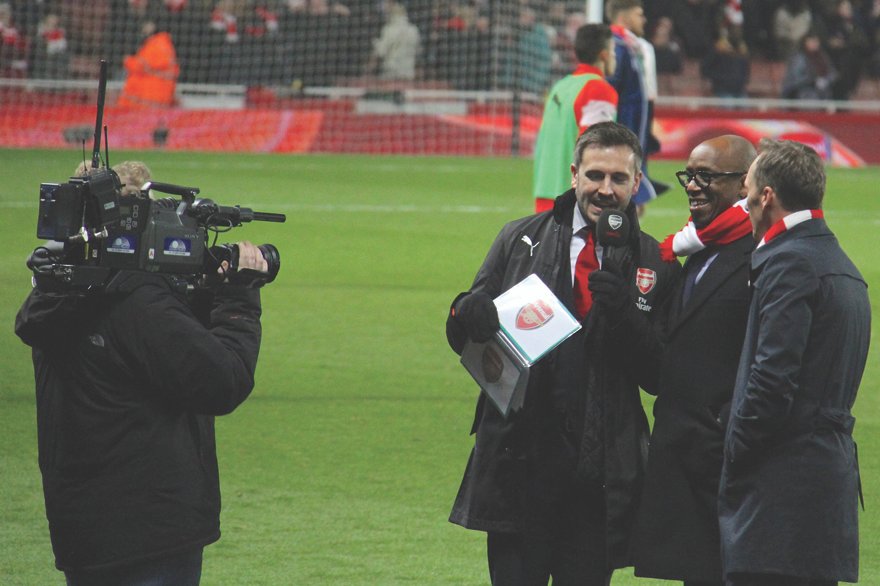It is Wright to talk about abuse
Not many people know that Brockley was the childhood home of legendary Arsenal striker Ian Wright.
The footballer, who lifted the Premiership title in 1998, grew up in a small one-room flat in Merritt Road.
He recalls at the beginning of his documentary Home Truths, now streaming on BBC One: “In many ways I have been lucky, but it’s not always been easy. Growing up, our home was not a happy one – there was a lot of violence.”
As Ian tries to remember his past life in South London, he tackles the very delicate subject of the lifelong trauma domestic violence inflicts on children.
For the first time in 50 years, he visits the tiny terraced house in Merritt Road and recalls how he used to share the apartment with another family.
Meanwhile he, his brother Maurice, his mum and his abusive stepdad all lived in one room.
But it wasn’t all doom and gloom. Ian actually found life-saving support in his primary school teacher at Turnham Academy.
He said: “I was so angry and unhappy, but there was one person who totally turned my life around, my teacher Mr Sydney Pigden.”
The footballer turned pundit said how Mr Pigden supported and steered him towards football stardom.
He said: “He gave me some self-worth, made me feel like I was important. He was the first imposing male figure in my life who tried to guide me on the right road.”
Ian had the chance to meet him again in 2005, few years before Mr Pigden’s death.
“He changed my life around,” said Mr Wright “I think about him literally everyday.”
Although he never told his teacher about the abuse at home, having his encouragement really helped young Ian Wright to shape his future.

And today, that same support is still given to young, troubled pupils at Turnham Academy, thanks to the head of the pastoral care Mr Anthony Alexander.
“My job is to make sure you kids are happy,” says Mr Alexander in the documentary. “We can’t necessarily change their home situation, but while they’re here, we can flood them with all the positive things they can achieve.”
And this is not the only support that children living in abusive households can get in South London.
Ian goes on to explore the pilot scheme started by Greenwich council to help parents and children struggling with domestic violence.
“We try to work with families at an earlier point,” explains one of the social workers who is leading the scheme. “It’s where you can tell that there probably is a problem brewing that could get worse with time.”
Their goal is to be there and help families who were referred to social services, before it’s too late.
Ian was also able to speak with Amanda and Jacob, parents to young Tasha, who are coming at the end of their course and confirmed with him that the programme helped them communicate more.
According to the documentary, over the past two years 140 families took part in this programme, and 85 per cent of them have confirmed that safety in their family has improved.
One top flight title, two FA cups, several TV shows and an MBE later, Ian Wright has come a long way from that small apartment in Brockley.
And yet, these stories brought him back to his childhood in South London and helped him deal with his personal trauma.
He said: “If I could talk to that nine-year-old me, I would say ‘you can do this, you are worth something’. Abuse creates a vicious cycle, and it’s up to all of us to stop it.”
‘It made me feel so helpless’
“My mum said ‘sorry’ when he had his hands around her throat” Ian Wright recalls when his stepfather grabbed his mother by the throat and pushed her up against the wall.
The former Arsenal star striker had repressed this painful memory from his childhood.
This until he decided to step inside his old house in Brockley, South London, after almost 50 years, for his documentary where he tackles the issue of domestic abuse.
He said: “She was trying to say ‘sorry’ when he had his hands around her throat.
“It made me feel so helpless.
“One of the memories I have is my brother covering my ears”.

Talking to Maurice about their violent childhood, the Arsenal legend remembers some of the brutal things that happened to him when he was nine years old.
The worst punishment for Ian happened on Saturday night, when he would get excited to hear the Match of the Day theme tune.
He said: “My stepdad would make me turn away to face the wall when it was on. Just because he could. And if I dared to peek, he would shout at me.”
On his life-changing journey through his childhood trauma, Ian Wright talks also about his emotional abusive mother with Dr Nuri Gene-Cos, the lead consultant psychiatrist at Maudsley Hospital, in Camberwell.
He said: “It was her words that really hurt me. She said to me ‘I wish I terminated you’. And I would scream ‘why didn’t you?’ and run out of the house.”
The pundit believes that his childhood trauma consumed him and his anger came out on the pitch.
“I couldn’t calm down. I regret how the anger took control of me,,” he said.
Today, Ian is a father and husband, but he decided to drag up his brutal past to highlight how damaging it is for children to witness domestic abuse.
Speaking to former abusers and social workers from South London, he discovered a disturbing truth.
In the 1970s, children who witnessed these assaults were not thought to be traumatised as a result.
In fact, only earlier this year children were recognised as victims of domestic abuse in the Domestic Abuse Act.
“One million kids in the UK are living with domestic abuse,” he said. “That has to change.”
